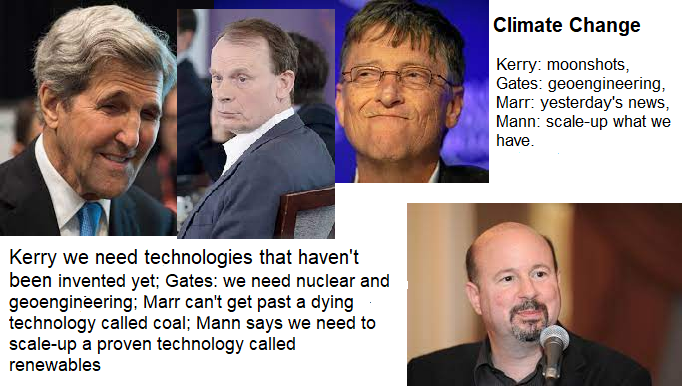The US climate envoy John Kerry says we need new technologies that haven’t been invented yet to combat climate change, but climate change scientist Michael Man says that not only is Kelly wrong, but he is dangerously wrong.
Then again, John Kerry has to speak to an audience that doesn’t get it. Kerry, US climate change envoy and former US Secretary of State, has been a strong believer in climate change for quite a while. He played a starring role in the Leonardo DiCaprio documentary Before the Flood, for example. He once introduced DiCaprio saying: “Who better to talk about the dangers of climate change than a man who has witnessed first-hand what happens when an iceberg breaks off?” Haha.
But actually, in the fight against climate change, Kerry does appear to be one of the good guys.
But in one vital respect, he is wrong, or so says renowned climate change scientist Michael Mann, author of The New Climate War.
"He is wrong," says Mann, because Kerry puts too much emphasis on technologies that haven’t been invented yet. The implication is that we need moonshots, like the technologies we invented during the NASA space programme of the 1960s. When President Kennedy committed America to landing a man on the moon that decade, the technology to do so hadn’t at that point been invented.
But while Mann is broadly positive about the Biden administration’s efforts to fight climate change, in one respect he disagrees: in an interview on BBC, he said: “The idea we have to rely on future tech to decarbonise our economy plays to this notion we can just kick the can down the road; that we can continue to emit carbon now because we will have the technology we can deploy a decade from now or two decades.” (47 minutes in.)
Kelly says that 50 per cent of the technologies we need to fight climate change haven’t been invented yet; Mann says the technologies already exist; but they need scaling up.
Gates vs Mann; one of them is right
One can nitpick. Mann is sort of right, existing technologies can be employed to fight climate change, but those existing technologies need to advance. As we invest in renewables and energy storage solutions, we will see advances; the technology will progress, and as this happens, there will be multiple breakthroughs.
But that wasn’t what Kerry meant — he talked about nuclear power, ideas advanced by Bill Gates, which could involve geoengineering (trying to manipulate the climate artificially) and carbon sequestration technologies.
Instead, what we need is more investment into what we already have, namely renewables. Mann fears that the more we invest into these moonshot type technologies, the less money is available to invest in technologies that we already know can work.
Then again, in an interview with Andrew Marr on BBC1 with Kerry, this writer was squirming with embarrassment. The embarrassment factor was not related to Kerry but the Marr questioning. He seemed more interested in catching Kerry out in creating controversy than getting to the truth.
This is not meant to be a criticism of the BBC, more a criticism of the current consensus in which the BBC, like most media, gets swept up.
The renewables revolution is possibly the best news our species has had in a long time. Not only can renewables save us from climate change because of the speed they are falling in price, but they can also make us better off.
And Marr seemed oblivious to this, instead asking Kerry cheap questions about US usage of coal, seemingly unaware that market forces are disrupting coal.
To defeat climate change, we don’t need to take a deep breath and accept we are all going to have to be poorer and change our diets. It is not about making hard choices, ditching efficient fossil fuels favouring more expensive clean alternatives. Instead, it is about nudging the markets, with government spending applied to accelerate that which is happening anyway, by focusing our resources on technologies that are changing the world, but trying to make them develop even faster.
But in one respect, many climate change advocates miss another example of disruptive technology that can mirror the success that renewables can bring.
Just as renewables can be applied to help defeat climate change and create super-cheap energy, making everyone bar oil companies better-off, other technologies can achieve this in another area.
Renewables can lead to cheaper energy; other technologies can lead to cheaper and cleaner food.
Gene editing technologies can create more efficient crops that don’t need antibiotics.
Ultimately, however, stem cell technology can be applied to create cultured or clean meat. Reports suggest that lab-grown meat could reach parity with traditional meat by 2030, which means, of course, it will be much cheaper in 2040.
But, as Michael Mann says, the fossil fuel industry has lobbied hard to try to support climate change denial, and then it seeks to delay the technologies that can defeat it. Similarly, cultured meat can transform meat production, a significant contributor to climate change, creating cheaper food. But those with interests in preserving traditional farming — a lobby that is an order of magnitude more powerful than the oil industry — won’t like it. (You can see why traditional farming communities will resist; you can even have sympathy. But these are different times; climate change must be defeated, an age of abundance beckons. It does mean change, however, and change can make people uncomfortable.






Related News
The AI revolution is here
Jan 25, 2023
The impossible conclusion about technology becoming less disruptive and why it is so dangerous
Jan 20, 2023
Tech bubble! Are you kidding?
Jan 06, 2023